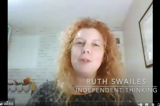As a secondary teacher, what can I learn from Early Years practice?
We asked Associate and award-winning EYFS expert Ruth Swailes and this is what she had to say.

"What can secondary teachers learn from Early Years practice? Probably on the surface, it doesn't look like very much at all because they're so very, very different. But I think if you look at the principles that underpin all our work in Early Years, there's quite a lot that you can take from those.
The Four Principles Of EYFS
There are the four overarching principles in the Early Years Foundation Stage (EYFS) and they come from the work that Dame Clare Tickell did, as she pulled in a lot of the research and evidence together back in 2011, when the new curriculum was being written.
So, those four principles are 1) that every child is unique, 2) that children learn and develop in different ways and at different rates, 3) that children learn well in enabling environments and 4) that positive relationships support children to learn.
I think if you take the word ‘children’ out of those four principles and replace the word with ‘people’ then it applies, regardless of age and stage, whether you're working with the elderly, whether you're working with adults or whether you're working with babies - people learn and develop in different ways, at different rates.
People learn and develop well in enabling environments as well as everyone is unique and, we all learn through positive relationships!
Get the Relationships Right
I personally believe that if you get the relationships right, regardless of what job you do, that makes a difference - it's all about relationships whatever you're doing.
So, we spend a lot of time in early years really fostering those strong bonds and relationships, not just with the children, but with their parents and caregivers as well.
So, it starts before children come to us at school or setting, we work really, hard on developing that trust, bond and relationship.
Their Most Precious Thing
We also must remember that parents are handing over their most precious thing to us, and we must respect that by showing that we care for their children and want to nurture them and give them the best start we possibly can!
We spend a lot of time working on that transition and we also spend a lot of time developing relationships and that's an ongoing process. It is a process, rather than an event so, throughout our time working in early years that relationship is very much a partnership with parents - it underpins everything that we do and through those really, strong bonds and relationships we can get to know that unique child and start to build on what they already know.
We don't look into a deficit in early years, we look deeply at what a child brings to us. Every child will have unique interests, special skills, special talents and our job is to nurture those and to get them to unfold and, we do that from those really great relationships that we have with the children.
The Third Teacher
We talk about the environment being the third teacher. So, the parent is the child's first teacher, we are the teacher right now and the third teacher is our enabling environment, we put the environment together, we plan it carefully, we choose our resources really, carefully and we arrange it in such a way that children can access it intensely.
They don't need an adult, they don't need to ask permission to go and fetch a ruler, they don't need to ask to go and get some cubes when they're working on their maths, they don't need permission to go and get a whiteboard and marker because they know where those things are, they know how to choose it, use it and to put it away and, they know that they're expected to take care of it.
So, we flip the narrative on that because we talk about the environment being the children's responsibility, like it’s the children's classroom not the teachers and they have to look after it and, even the youngest children can be taught how to how to do that with really great modelling.
By doing this, it frees the teacher up to spend time having those conversations with children and spend time developing those relationships with children so, that you can recognize the uniqueness of the child and reflect that in your practice.
Flexibility and Joy
So, what you will see in early years is people responding to children's interests and developing the curriculum around that as well so that we have the flexibility to be able to respond to the children and to say to the children “Well, we can see that you're engaged in this, so we're going to take that further” and that is the joy of being an early years practitioner. I think we can learn a lot from each other, and I always talk about professional respect because I truly believe we can learn a lot from secondary colleagues and vice versa."
You can check out all the other 'tracks' on our CPD Jukebox by clicking here. [ITL]
To find out more about booking Ruth for your school, college or organisation call us on 01267 211432 or drop us an email on learn@independentthinking.co.uk.
Enjoy a free no-obligation chat.
Haggle a bit. Make a booking.
Call us on +44 (0)1267 211432 or drop us a line at learn@independentthinking.co.uk.

About the author
Ruth Swailes
Ruth is an award-winning specialist and author in the area of Early Years and Foundation Stage education with a breadth of experience in senior leadership, headship, moderation and in SEN advisory work.